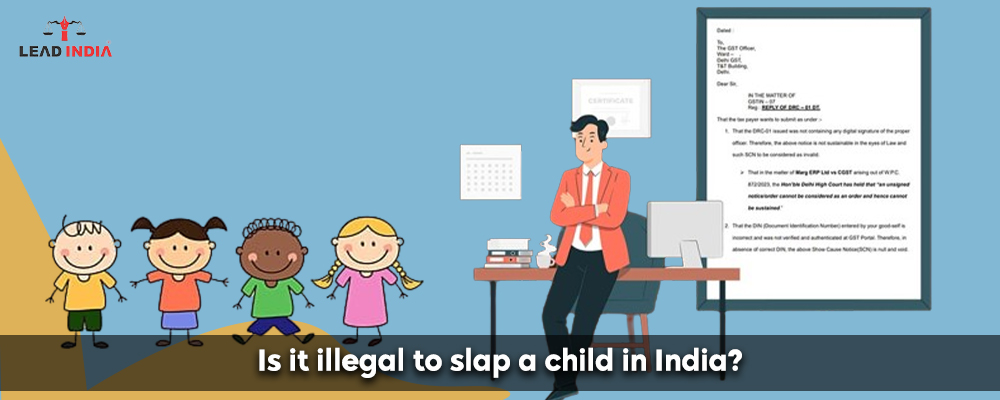Any form of discipline that involves the use of physical force to inflict little pain or discomfort is referred to as corporal punishment. The most common ways to administer this punishment are with the hands spanking, slapping, punching, or by hitting using a stick, belt, shoes, etc. Children may also be kicked, scratched, pinched, bit, or have their hair pulled. However, these sanctions can sometimes take the shape of psychological maltreatment. These consist of scaring, threatening, shaming, and demeaning a child. It could be mental or physical. In Indian law, the word “corporal punishment” is not defined by statute.
Need A Legal Advice
The internet is not a lawyer and neither are you. Talk to a real lawyer about your legal issue

Continued use of physical punishment
The continued use of corporal punishment has multiple justifications. The fact that most of us struggle to distinguish between discipline and physical punishment is one of the main causes. We do not comprehend how it differs from discipline. Parents discipline their children when they misbehave or behave in a certain way using physical punishment. However, what we often overlook is that a child can learn appropriate and desirable behavior through positive disciplinary methods, all without having to worry about facing consequences.
Another significant problem is that teachers are not taught to consider the possible causes of a child’s behavior when they are undergoing training. Positive discipline strategies are not well-known among teachers. It has been noted that when a child feels as though he is not receiving enough attention, he frequently misbehaves. Physical, verbal, mental, and other forms of emotional punishment are used when a teacher strikes out at a student because they are unable to maintain control over them or do not have the necessary abilities to deal with them
Legal implications of slapping a child
- Article 21 of the Indian Constitution: The “right to life and dignity” is envisioned in Article 21 of the Indian Constitution. This covers every child’s “right to education” until they turn 14 years old. The Supreme Court of India ruled in the historic 1993 case of Unni Krishnan v. State of Andhra Pradesh that receiving a basic education is an implied right under Article 21 when read in conjunction with the Directive Principles of State Policy (DPSP) on education under Article 41. The Court went on to say that these rights should be interpreted in light of the DPSPs, which include Article 45, which mandates that the state work to ensure that all children have access to free and compulsory education within ten years from the commencement of Constitution’s
- Article 39 of the Indian Constitution: Article 39(e) requires the State to take proactive measures to prevent abuse of vulnerable children. Furthermore, Article 39(f) mandates that the State take progressive steps to guarantee that children are provided with opportunities and resources to enable them to develop in a way that is both healthy and clearly defined. It will be made sure that a person’s youth is effectively shielded from exploitation and both material and moral abandonment.
Act of 2000 Concerning Juvenile Justice (Care and Protection of Children)
- Section 23: The person who has “actual charge or control over” a child is primarily covered under Section 23 of the Juvenile Justice (Care and Protection of Children) Act, 2000. Anybody who has control over a kid, such as parents, guardians, instructors, employers, or anybody else, is covered by this section and imprisonment, which may extend to 6 months.
- Section 75 of the Act: The Act’s Section 75 specifies the penalty for the offense of cruelty towards minors. If an employee or other person entrusted with the care and protection of a child causes physical or mental injury to the kid, or if the child is assaulted, abused, exposed, or neglected, the accused faces up to five years of severe punishment and a fine of up to Rs. five lakhs. If children develop physical or mental disabilities, the penalty might be extended by up to ten years.
Our society is still based on the antiquated belief that “spare the rod, spoil the child,” which leads to parents punishing their kids inexplicably. The Indian government outlawed the use of physical punishment anywhere in the nation. Nevertheless, schools and students do not yet have access to the UN Convention on Child Rights’ legal provisions. Corporal punishment is still used in households and classrooms today. Developing nations have formulated plans and alternative forms of discipline to raise awareness about the negative impacts of corporal punishment on the mental and physical well-being of children. It is impossible to guarantee that the child won’t receive reprimands or physical abuse.
Lead India provides various legal services, including free legal advice and internet information. We provide a facility in which you can talk to a lawyer and ask legal questions regarding the law here. Lead India’s lawyers can assist you with any legal issues. In India, Lead India provides free legal assistance online. In addition to receiving free legal advice online, Lead India allows users to pose inquiries to experts for free.





 Talk to a Lawyer
Talk to a Lawyer